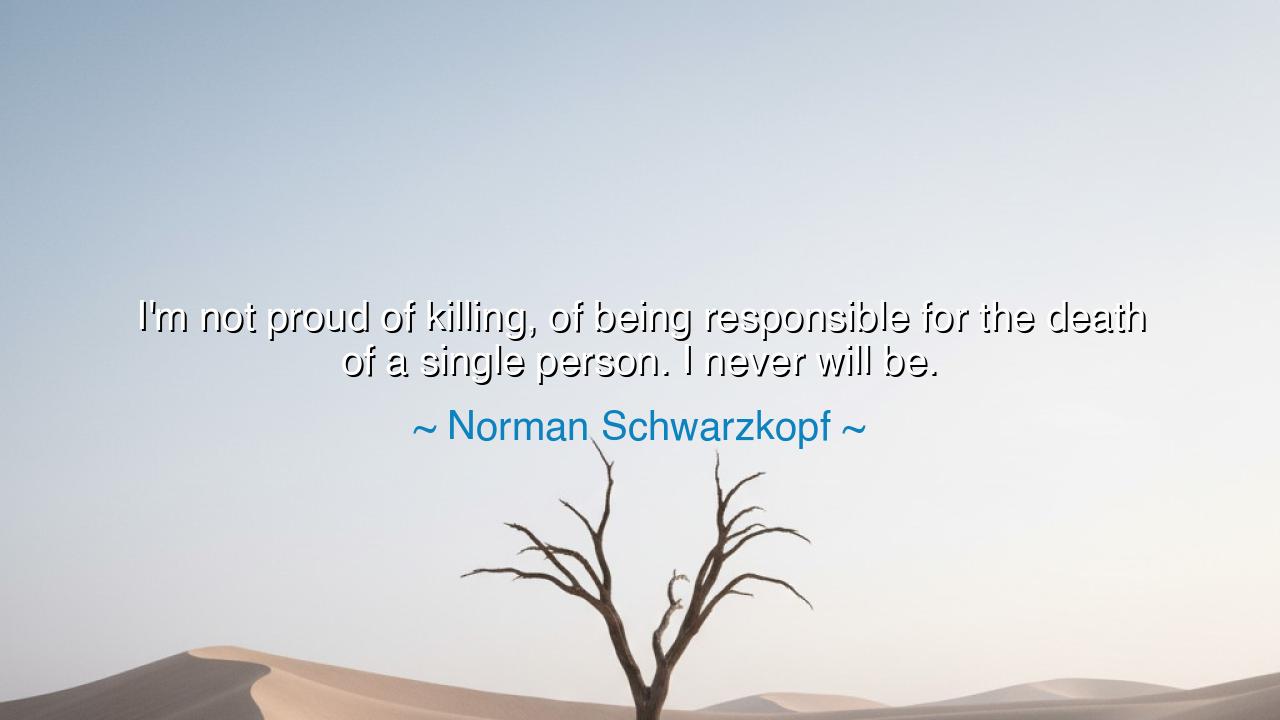
I'm not proud of killing, of being responsible for the death of a
I'm not proud of killing, of being responsible for the death of a single person. I never will be.






The warrior Norman Schwarzkopf, commander of armies and servant of his nation, once said with solemn gravity: “I’m not proud of killing, of being responsible for the death of a single person. I never will be.” These words, spoken by a man who had seen the fires of war and stood upon the fields of victory, pierce through the illusions of glory that so often surround battle. In them lies the wisdom of a soldier who has looked into the eyes of death — not as an idea, but as a reality — and returned to speak truth to a world too eager to romanticize conflict. His confession is not weakness, but strength; not remorse alone, but the voice of humanity surviving within the machinery of war.
From the earliest chronicles of time, mankind has written of heroes and conquest. Yet the oldest stories also whisper of the price of violence, the toll upon the soul of those who must wield the sword. When Achilles, the mightiest of the Greeks, slew Hector before the gates of Troy, the poets sang of his triumph — but they also told how his heart broke with grief. For even the greatest warrior cannot escape the sorrow of taking another life. Schwarzkopf’s words echo that same ancient truth: that true valor is not found in the pride of killing, but in the burden of conscience carried by those who must.
To lead men into battle is no small thing. Schwarzkopf, the commander of coalition forces during the Gulf War, was hailed as a hero — yet his greatness lay not in his victory, but in his understanding of its cost. He had seen the devastation wrought by weapons, the fear in the eyes of the fallen, and the silence that follows when the cannons cease. His words remind us that war is not a triumph of the human spirit, but a failure of peace. Even necessary wars — fought to end tyranny or protect the innocent — leave scars upon the hearts of those who fight them. For every medal, there is a memory; for every victory, a life forever lost.
“I’m not proud of killing,” he says — and in that humility lies the mark of true nobility. The false hero boasts of destruction; the wise one mourns it. Schwarzkopf understood that the purpose of the soldier is not to celebrate death, but to preserve life. This is the sacred paradox of the warrior’s path: he must sometimes fight to end fighting, kill to prevent further killing. Yet he who forgets the weight of that responsibility becomes dangerous, for pride in violence is the seed from which cruelty grows. To regret killing is not cowardice — it is civilization.
History offers many mirrors of this truth. Emperor Ashoka of India, after a long and bloody conquest, looked upon the bodies of the slain at Kalinga and was overcome with despair. Once a conqueror, he laid down the sword and devoted the rest of his life to peace and compassion. Like Schwarzkopf, Ashoka realized that no victory can erase the sorrow of lives destroyed. His remorse transformed him from a warrior into a teacher, from a man of force into a man of faith. Thus, through the pain of battle, he discovered a higher purpose — to ensure that others would not suffer as he had made them suffer.
The origin of Schwarzkopf’s quote lies not only in the aftermath of the Gulf War but in his lifelong reflection on the nature of duty and morality. Though celebrated for his leadership, he never allowed fame to dull his conscience. He spoke often of honor, but not the hollow honor of conquest — rather, the moral integrity that compels one to face truth, however painful. To acknowledge sorrow in victory is the sign of a leader who values life above power. His words are a warning to every generation: that to glorify death is to lose sight of our own humanity.
The lesson in his statement is one of accountability and compassion. Whether on the battlefield or in daily life, we all wield power — through our words, our choices, our influence. To use that power without reflection is to invite ruin; to use it with conscience is to serve the higher good. When we harm, even unintentionally, we must grieve the harm; when we succeed, we must remember the cost. Let every person who holds authority — in war, in government, or in home — remember Schwarzkopf’s wisdom: do not take pride in destruction, even when it feels justified.
And so, Norman Schwarzkopf’s words endure as a sacred reminder that the greatest warriors are not those who revel in death, but those who honor life even in the face of war. His voice joins the chorus of the ages — of soldiers, poets, and philosophers — who remind us that the true enemy is not the foe across the field, but the hatred within the human heart. To live by this wisdom is to ensure that our strength is tempered by mercy, that our courage serves peace, and that when our time comes, we may say, as he did — not with pride, but with humility — “I have done my duty, but I have never rejoiced in death.”






AAdministratorAdministrator
Welcome, honored guests. Please leave a comment, we will respond soon